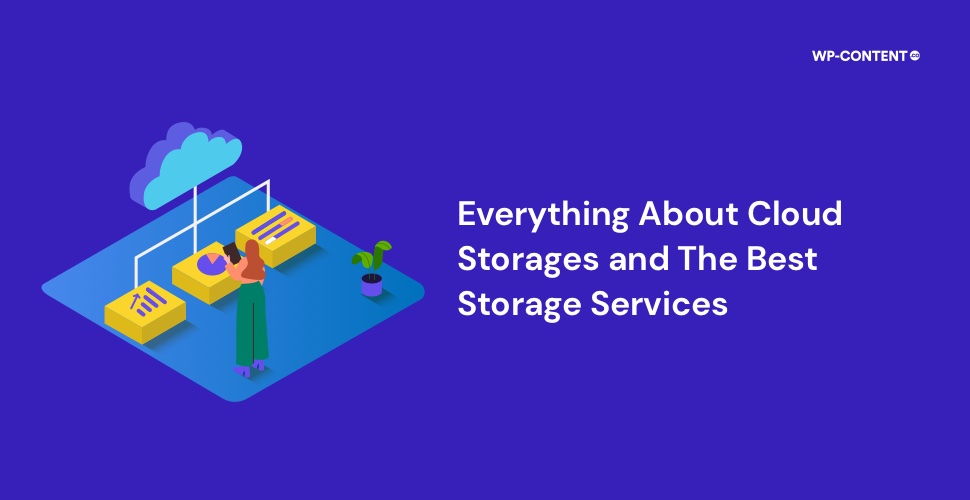Storage and data transfer options have evolved over the years – from magnetic tapes to magnetic drums, Williams Tube, Floppy disks, CD/DVDs, internal hard drives to external ones, USB drives and lightning-quick SSDs, and cloud storage services. There are many more in between, but the point is there are many ways to store and access data. The data and files are valuable, irreplaceable and important, therefore storing and accessing them has always been a cause for concern.
Cloud storage services are a good option for accessing the data from anywhere, it acts as a proper backup and also offer good security. Before we dive into the best cloud storage services, we need to understand cloud storage, its different types, and the benefits of cloud storage.
What Exactly Is a Cloud Storage?
The term cloud storage will sound a bit confusing to the uninitiated. It simply means storing all the data on a server in a secure location that can be accessed through the internet from anywhere around the world. Usually, all the data and files are stored in an off-site location and are handled by an external cloud storage service provider. The cloud storage service provider would handle the daily backups, the security, the monitoring and also provide all the needed hardware. Once the data has been transferred to the cloud servers, it is the service provider’s responsibility to maintain the data servers and keep them running 24×7, fully optimized.
Cloud storage servers are spread across multiple locations and servers. All of us are already using cloud storage, in the form of one that comes bundled with our email service provider. For Google it is Drive and for Microsoft, it is One drive and varies depending on the service provider. Now, there will be a barrage of questions on your mind regarding cloud storage and we will cover all of them.
- How exactly does cloud storage work, and how do I upload files?
- Are cloud storages safe?
- The different types of cloud storage.
How Exactly Does Cloud Storage Work and How do I Upload Files?
First of all cloud storage locations or server farms can be either small or large. Their size, power and service requirements vary from location to location. Cloud storage service providers use servers to store the data. Once a subscription plan has been bought, one can access the cloud storage servers through the internet or a private connection, through an app or a web portal or a website. All the data and files are stored on multiple servers to make sure that they are safe from data loss and can be accessed at any time.
Even if one server is down for maintenance or some hardware failure happens, the data will still be accessible. If a user needs more storage space, they can simply upgrade their plan. We never know which server in which location we are accessing, as the servers are spread across the globe to tackle the issue of data loss.
Also read: The Best CDN Services For WordPress
Are Cloud Storages Safe?
Cloud storages are safe and secure. All the data and files that are uploaded are encrypted and they are constantly monitored to avoid any sort of data breach. Above all, the data is stored not just on one server but on multiple servers, which acts as a backup in case of data loss on one server. Once a file has been uploaded to a server, it is immediately copied to different servers around the globe. They have built-in firewalls to prevent any sort of unauthorized attempts and the majority of them conduct in-house or hire third parties to test the safety of their network, to find security loopholes and rectify them.
One thing that the users can do is to enable two-factor authentication as an added layer of security. All of the cloud storage service providers use the leading encryption technology and firewalls to make sure the data is safe.
The Different Types of Cloud Storage
There are three main types of cloud storage- Private, Public and Hybrid cloud
Public Cloud Storage – Here one accesses the cloud storage network through the internet. Everything is maintained by the service provider and there will be other companies also using the same service. One can access the cloud from almost all devices and multiple users who are given authorization can also join the cloud and access the files. Public cloud storages are easy on the pockets, is highly scalable and provides all the other benefits of cloud storage like backup and security.
Private Cloud Storage – Only one entity is present here. It can be an organization or a person. Here the server resources are not shared with other companies or persons like in the public cloud storage. Private cloud storage can be located on-site or on an external site. This is more suitable for businesses and organizations that house sensitive documents and need their own private space to store them.
Hybrid Cloud storage – As the name suggests it combines both private and public cloud storage and also uses on-site resources. Here one has the choice to decide on which server the data should be stored – on the public or private cloud server. All the important and sensitive data and files can be stored on the private cloud and other non-sensitive information, data, and applications on the public cloud server.
Now, how cloud storage works depends on the type of storage or the storage architecture they make use of. We won’t be getting too in-depth with the storage structure, but the three main types are:
- Block Storage Type – also known as block-level storage, they are commonly found in SAN or Storage Area Network. They are mainly opted for when there is a need for efficient data transfer with low latency. Here data is broken down into blocks, they are stored separately and given a unique identification number.
- File Storage Type – also known as file-level or file-based storage, it saves all the data in files in a hierarchical manner. The files are then added to folders and organized in directories and subdirectories. It is commonly connected with Network Attached Storage (NAS).
- Object Storage Type– Stores data as objects and has three main elements:
- File Mapping
- An infinite amount of Metadata can be defined by the user in most cases, like the category and so on.
- Unique Identifier Number- a 128-bit value assigned to easily retrieve the needed information when called for.
Also read: Best Dropbox WordPress Plugins
The Best Cloud Storage Services
1. Sync
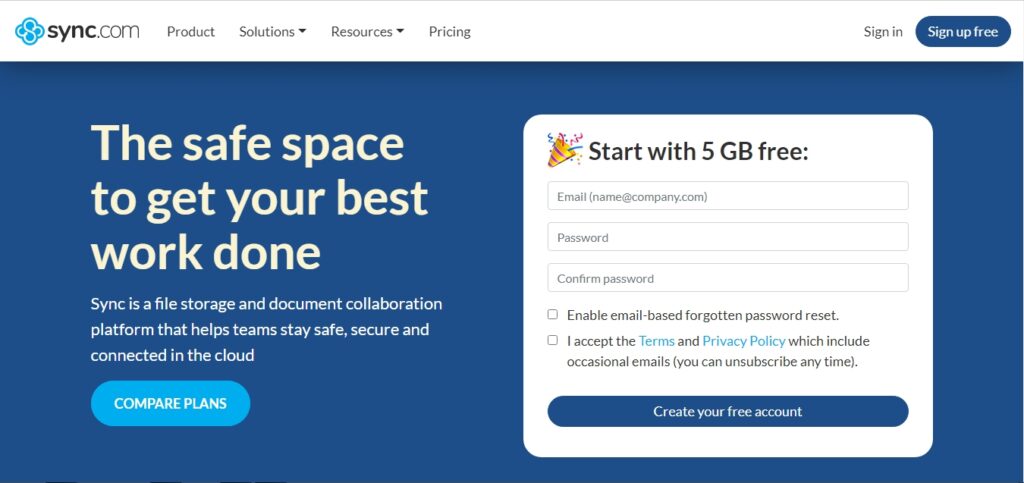
Sync offers a free account that provides 5GB of storage space that will never expire. Sync also provides zero-knowledge encryption as standard. All the files can be shared and accessed by users who do not have a sync account. Sync offers four paid plans- two for individuals and two for teams. The individual plans are- Solo Basic at $8/monthly offers 2TB of storage and allows one user and Solo Professional at $20/month offers 6TB and one user.
Two team plans are – Teams Standard at $5 user/month provides 1TB and two-plus users and the Teams Unlimited at $15 user/month offers unlimited storage and two-plus users. Sync also offers a Vault folder, and all the files have to be copied manually. All the files inside the vault folder won’t sync across all the devices.
2. Nord Locker
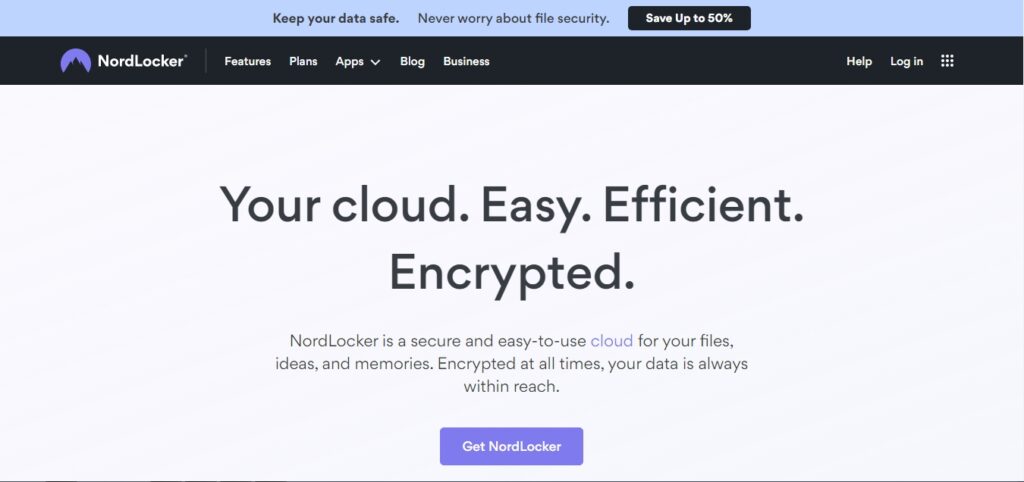
NordLocker offers cloud storage plans that start at $3.99/month and offers 500GB of cloud storage. If you want more storage you can opt for the $9.99/month plan that provides 2TB of storage. There is also a free plan that provides 3GB of storage, suited for individuals that just want to backup a limited set of data and files. For Business purposes, NordLocker offers three plans- 500GB at $12.99 user/month, 2TB at $18.99 user/month and a Custom plan. Nord Locker app is available on Android, iOS, Windows and Mac. This is the same company that developed the famous NordVPN. One con of Nord Locker is that they only provide assistance through email and there is no phone support.
3. Backblaze
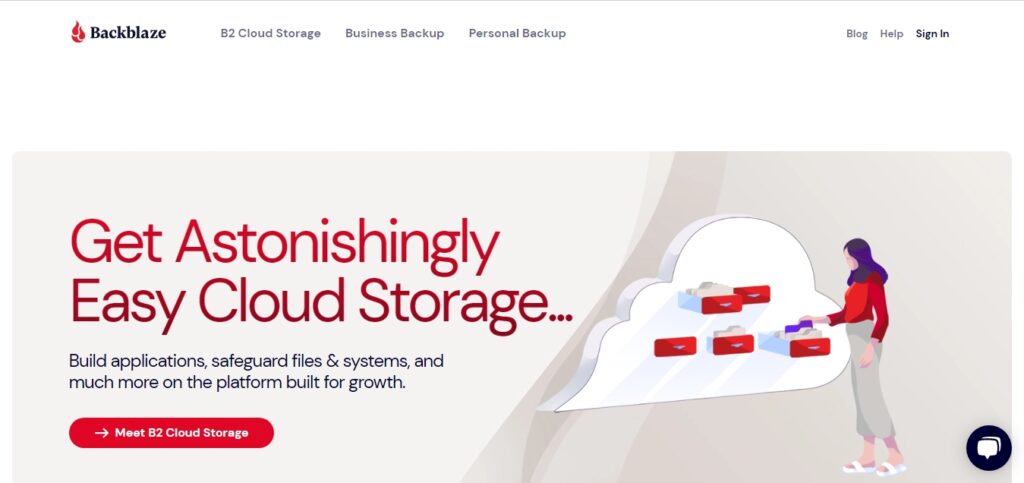
Backblaze offers truly unlimited storage at affordable prices. Backblaze offers B2 cloud storage, Business and Personal Backup plans. There is no file size restriction on Backblaze. Backblaze provides security features such as 2FV- SMS and Authenticator apps and also a private encryption key. The Business and Personal plan starts at $7/monthly. Backblaze offers a pricing calculator on its website, making it easy for users to see what the final cost would be.
4. Icedrive
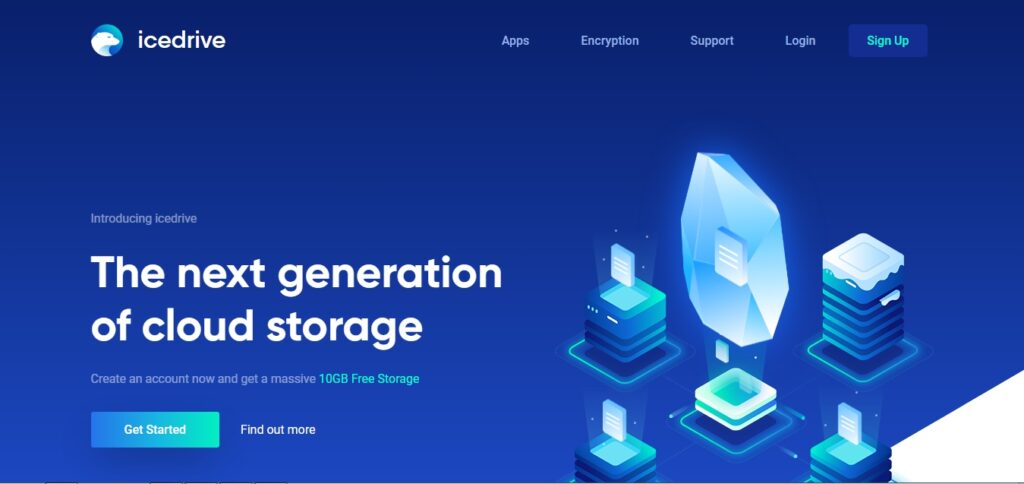
Icedrive is the only cloud storage provider that uses Twofish encryption. The files are already encrypted before it reaches their server, which means that no data can be intercepted during the upload process and provides total privacy. Only the user can decrypt the data here. Icedrive offers 10GB of free storage and they have three paid plans. The Lite plan starts at $1.67/month and offers 150GB of storage. The Pro plan starts at $4.17/month and offers 1TB whereas the Pro+ plan priced at $15/month offers 5TB of storage. They also offer a lifetime plan with one-time payment starting from $99 for the Lite plan which offers 150GB, the Pro at $229 offers 1TB and Pro+ at $599 offers 5TB.
Also read: Best WordPress Watermark Plugins
5. Box
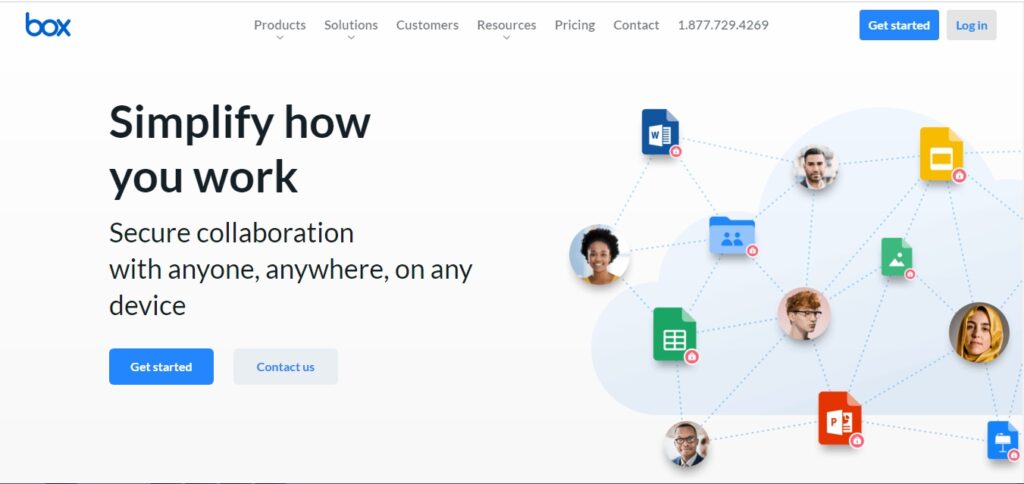
Box offers 10GB of storage for free users. They have cloud storage plans for individuals/teams and also for business entities. The business plans have unlimited storage with built-in integration with Microsoft 365 and Google Workspace and Slack. Free users have an upload limit of 250MB. The Box is best suited for business purposes rather than for personal use. They offer data loss protection, 2FA and over 1500 enterprise application integration.
Individual and Teams plan offers three options- the free plan, then the Personal Pro at $14/monthly allows one user with 100GB storage and 5GB file upload and the Business starter at $7 user/monthly and allows up to 10 users. There are four business plans- Business priced at $20 per user/monthly, Business plus at $33 per user/monthly, Enterprise at $47 per user/monthly and a Custom plan.
6. pCloud
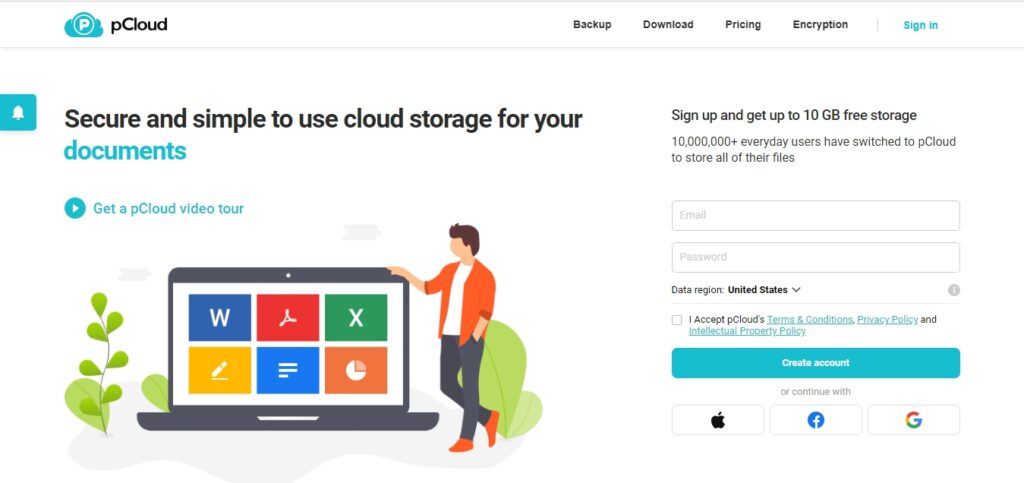
pCloud offers 10GB of storage for free users on signup. There are three categories – Individual, Family and Business plans. The Individual plan has two options, either pay annually or a one-time payment. The yearly cost is $49.99 for 500GB of storage and $99.99/annually for 2TB storage. The one-time payment is $175 and $350 respectively. The Family plan is a one-time settlement of $500 that offers 2TB of storage and allows up to five users. The business plans start at $7.99 per user/monthly and $9.99 per user/monthly. Files can also be added from remote URLs.
There is no file size restriction in terms of upload and one can upload large files and media. pCloud doesn’t offer any live chat or phone support, one has to contact them through the given email address. One has to buy their encryption service known as pCloud crypto and pay for it annually or a one-time settlement for client-side encryption.
7. Livedrive
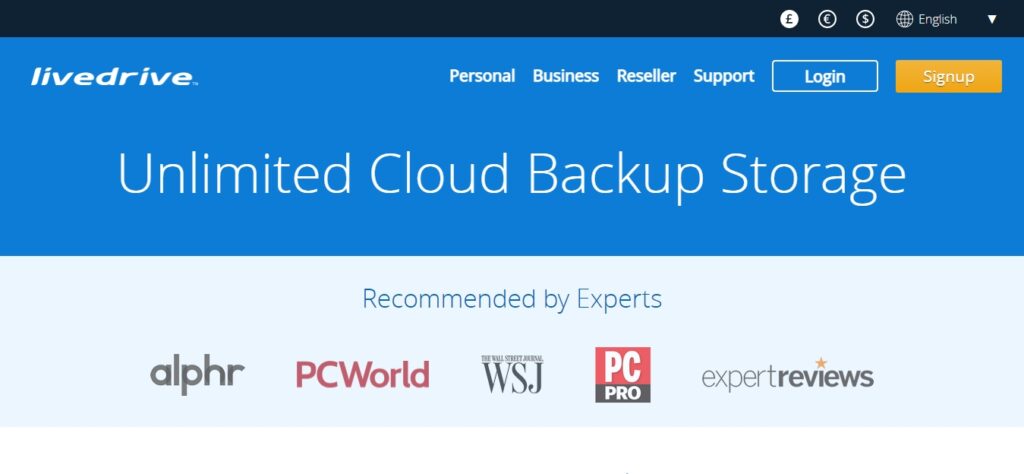
Livedrive offers three choices- Personal, Business and Reseller and there is no free plan, but one can try the plans for 14 days before purchasing one. Livedrive offers two unlimited storage plans- Backup priced at $8.99/month and Pro Suite Plan at $25/month. The backup plan allows for only one PC but with unlimited storage, the Pro suite plan allows us to back up 5 computers. There is a third plan called the Briefcase plan ($16/month) which provides 2000GB of storage space.
There are two business plans- Business Express ($50/month) and Business Standard ($160/month). Business Express provide 2000GB of storage and allows three users while the Business Standard offers 10,000GB of storage and 10 users. More users and storage can be added with additional fees.
8. iDrive
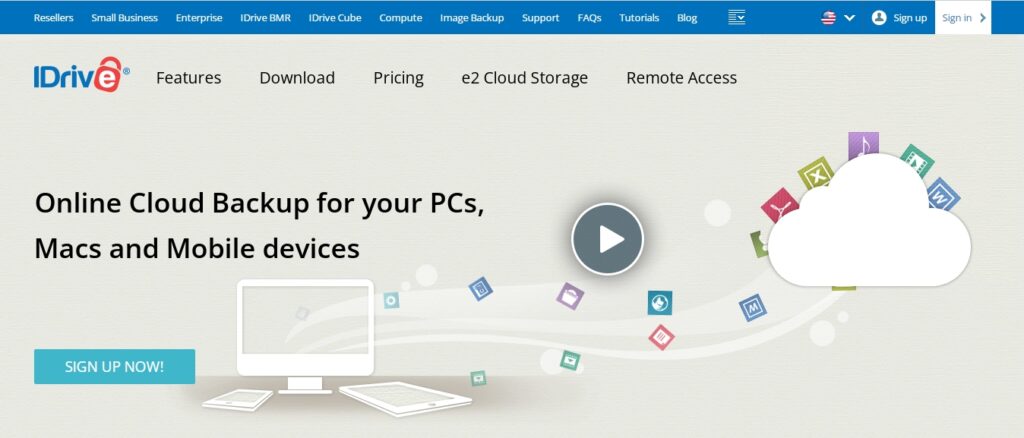
iDrive offers an impressive set of plans at affordable pricing. The free plan offers 5GB and there are four paid plans. iDrive Mini, iDrive Personal, iDrive Team and iDrive Business plans offer multiple choices to choose from. One can opt for how many users or computers and storage and choose the best plan accordingly. iDrive also privdes an option for NAS backup.
Also read: Top WordPress Backup Solution
9. Google Drive
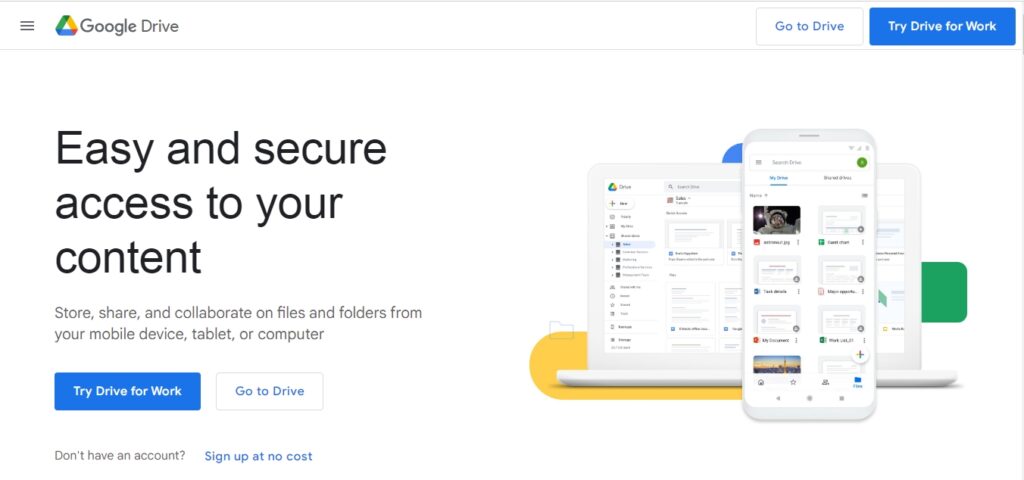
Google Drive offers 15GB of free storage out of the box with its google account. One can upload all sorts of files from documents, videos, images and so on. One can avail of more storage for Google Drive through Google One– The basic plan at $1.99/month offers 100GB, the Standard plan at $2.99/month offers 200GB and the Premium at $9.99/month provides 2TB of storage. There are 10TB, 20TB and 30TB plans that can be accessed if you are already a Google One user.
10. Dropbox
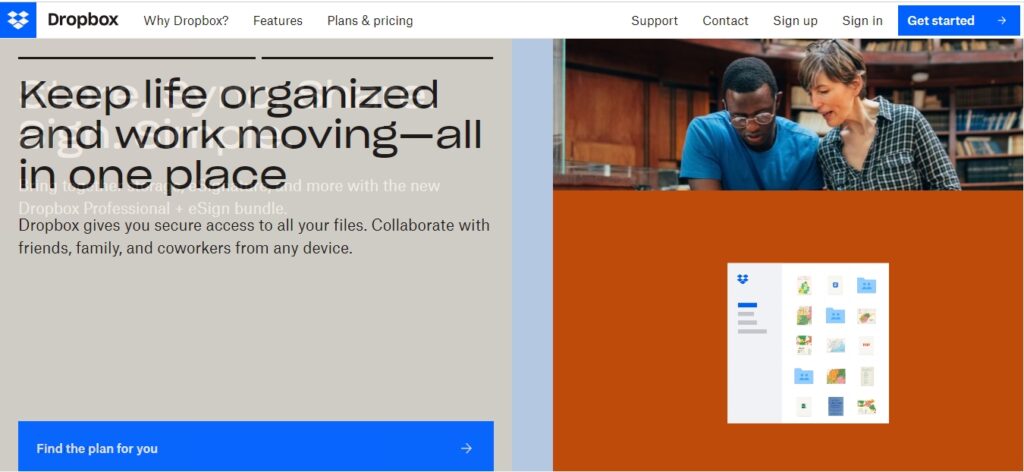
Dropbox offers only 2GB of free storage with its basic plan. The file size upload limit varies depending on the way the file is uploaded. The file upload limit through desktop app or mobile app is under 2TB or smaller. Files uploaded from dropbox.com must be 50GB or smaller. Dropbox offers a collaborative space and is helpful for creative collaborators. One can share all the files and other documents needed for a project in a clutter-free environment and keep everything organized.
Dropbox provides two plans for personal use and three plans for Business purposes. The personal plan starts at $9.99/month which provides 2000GB but only one user and the family plan under Personal is priced at $16.99/month provides 2000GB of storage and allows up to 6 users. There are three plans under the Business category- Professional (for individuals) priced at $16.58/month offers 3000GB and allows one user. The Business Standard plan at $12.50 user/monthly gives 5000GB and allows 3 users. The Advanced Business plan at $20 user/month allows three users and as much storage as needed.
11. Microsoft OneDrive
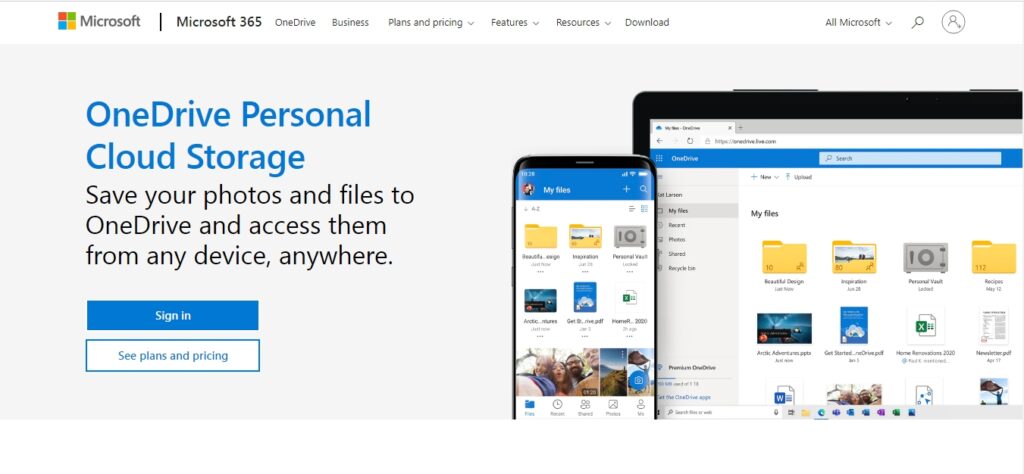
Microsoft OneDrive offers the best integration with all the Microsoft services. OneDrive offers 5GB of cloud storage for everyone who signs up. OneDrive is closely linked with Microsoft 365, which is beneficial to boost productivity across multiple applications. Onedrive offers ransomware detection and removal. OneDrive offers plans under the Home and Business category. The Home plan which starts with OneDrive Basic plan offers 5GB of storage, then the OneDrive standalone at $1.99/month offers 100GB of storage, Microsoft 365 personal priced at $6.99/month offers 1TB of storage, and the last plan Microsoft 365 Family at $9.99/month offers a total of 6TB of storage and allows up to 6 users, all the other plans only allow one user.
For business purposes, there are four plans- OneDrive for business plan 1 at $5 user/month gives 1TB per user, and OneDrive Plan 2 at $10 user/month also provides 1TB per user but offers more security features and can also be extended to unlimited storage later. The other two plans are Microsoft 365 Business Basic at $6 per user/month and Microsoft 365 Business Standard at $12.50 per user/month. The OneDrive app is not available for Chromebook users, but the web version still works fine.
12. Mediafire

Mediafire offers 10Gb of free storage with the basic plan. The basic plan is not ad-free, so keep that in mind. There are two paid plans and the maximum file size for a single upload is capped at 20GB. The Pro plan at $3.75/month provides 1TB of storage and allows only one user, and the Business plan at $40/month allows up to 100 users and up to 100TB of storage. There is no bandwidth limitation, but the free accounts would expire if it is inactive for 8 months.
Also read: The Best Stock Video Websites
13. iCloud
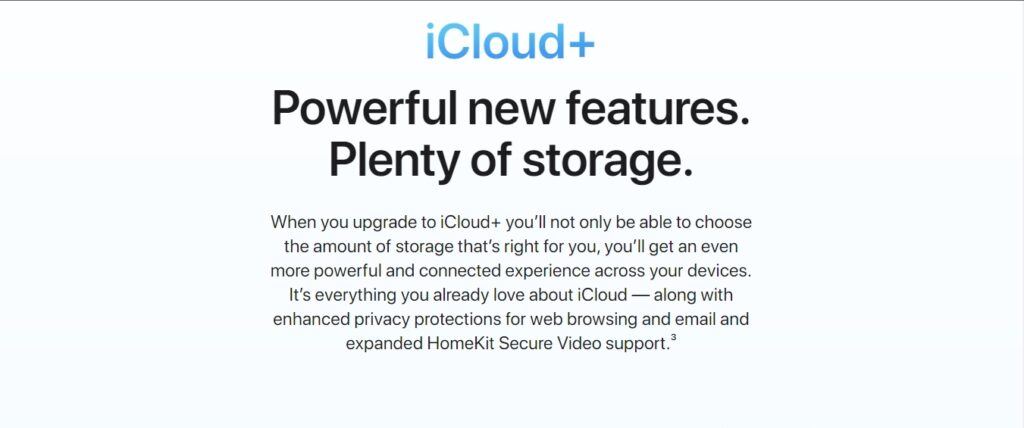
iCloud is more suited for personal backup rather than for business purposes. It is best suited for creating a backup of the field on the Mac and iPhone. iCloud is helpful for those who are already in the Apple environment, as iCloud will automatically back up everything regularly. The biggest con is that it is only for Apple devices. The paid version of iCloud offers three plans- iCloud+ with 50GB priced at $0.99/month, and iCloud+ with 200GB at $2.99/month and iCloud+ with 2Tb at $9.99/month.
Wrapping Up
Cloud storage is important for everyone who wants to keep a backup of their data and files. Apart from backup, one can also access the files from anywhere. Cloud storage helps to reduce the burden on the onsite employees by reducing their workload. With cloud storage, there is no need to set up a storage server on-site and also do its maintenance, thereby allowing the employees to focus on other aspects.
Disclosure: This post may contain affiliate links, which means we may receive a commission if you click a link and purchase something that we shared. Read more about Affiliate disclosure here.
